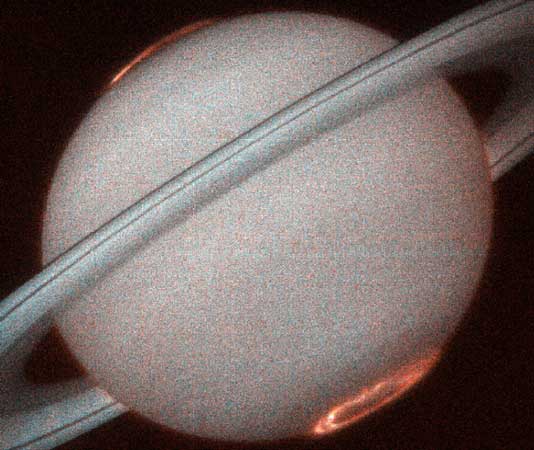
|
Explanation: Girdling the second largest planet in the Solar System, Saturn's Rings are one of the most spectacular sights for earthbound telescopes. This image from the orbiting Hubble Space Telescope's STIS instrument, offers a striking view of another kind of ring around Saturn - pole encircling rings of ultraviolet aurora. Towering more than 1,000 miles above the cloud tops, these Saturnian auroral displays are analogous to Earth's. Energetic charged particles in the Solar Wind are funneled by the planet's magnetic field into polar regions where they interact with atmospheric gases. Following the ebb and flow of Saturn's aurora, researchers can remotely explore the planet's atmosphere and magnetic field. In this false color image, the dramatic red aurora identify emission from atomic hydrogen, while the more concentrated white areas are due to hydrogen molecules. In 2004, NASA plans to begin making close-up studies of the Saturnian system with the Cassini Spacecraft.
|
January February March April May June July August September October November December |
| ||||||||||||||||||||||||||||||||||||||||||||||||
NASA Web Site Statements, Warnings, and Disclaimers
NASA Official: Jay Norris. Specific rights apply.
A service of: LHEA at NASA / GSFC
& Michigan Tech. U.
Based on Astronomy Picture
Of the Day
Publications with keywords: aurora - Saturn
Publications with words: aurora - Saturn
See also:
- APOD: 2026 February 10 Á In Green Company: Aurora over Norway
- APOD: 2025 October 5 Á A Long Storm System on Saturn
- APOD: 2025 November 16 Á Crossing Saturns Ring Plane
- APOD: 2025 September 25 Á Saturn Opposite the Sun
- APOD: 2025 September 22 Á Equinox at Saturn
- APOD: 2025 February 23 Á Saturn in Infrared from Cassini
- APOD: 2025 January 7 Á A New Years Aurora and SAR Arc
